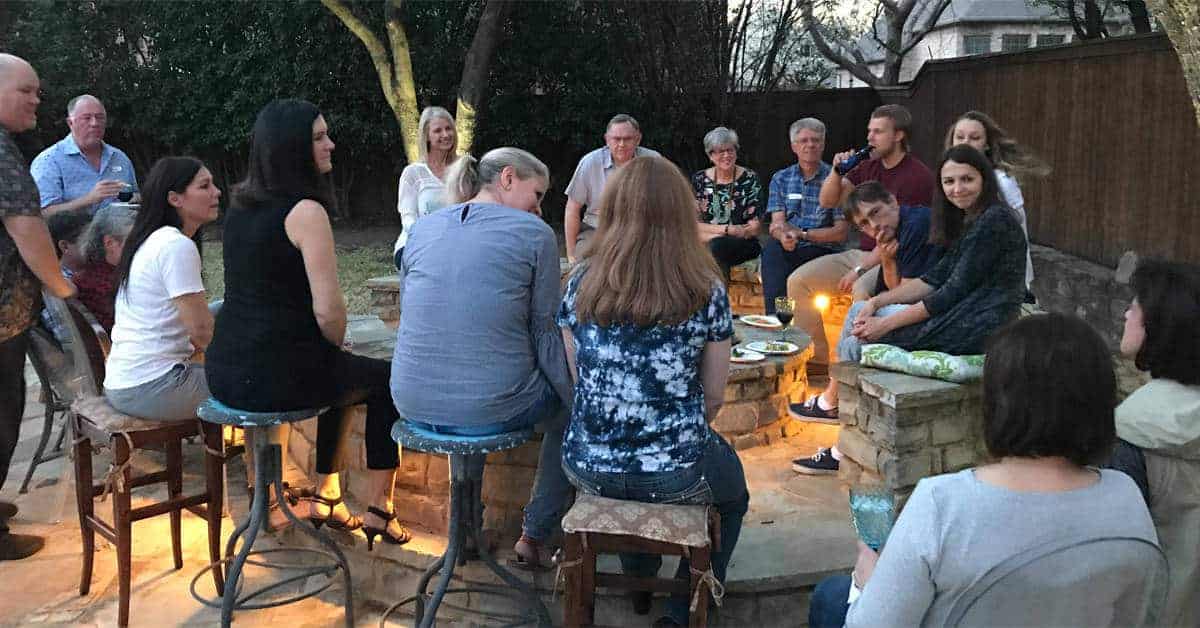A reader from Lifestream, currently living in the DC area, recently sent me an excerpt from an incredible article about a baby’s need for love. Being a recent grandfather I found this particularly appropriate. It is from an article entitled The Long Term Effects of Institutionalization on the Behavior of Children From Eastern Europe and the Former Soviet Union Research, Diagnoses, and Therapy Options and discusses the difference between babies who develop in families and those that develop in institutions.
Joshua, who sent me this article, said he came across it after being involved in a small-group discussion as to why Christian growth is so difficult. This is as clear a picture as I have seen about the difference between institutional environments and families, and why Jesus saw the body of Christ not as an institution that conforms the new believer, but as a family that nurtures their growth in him. What do you think? Here are some excerpts of that article (emphasis mine):
Between 6 and 9 months, babies begin to form selective attachments to consistent caregivers. These selective attachments affect emotional bonds, behavior and thought processes. Caregivers contribute to this by their responsiveness to the children. Through these attachments, children can learn about themselves, looking to the caregivers for safety and information about the world. If a child is feeling insecure and can seek proximity to the caregiver, they feel safer. Once they have a secure base, they can venture out in exploratory behavior. When they get worried or feel insecure, they can go back to the caregivers for a dose of security, then venture out again. They learn to use visual referencing, looking back to the caregivers for reactions and support. As they get older, they begin to use internal representations when they are not in sight of the caregivers; “What would she think if I do this?” These attachments teach children what to expect from future relationships. They help the children develop an identity, to know who they are, to have a sense of self.
Things are quite different in ‘ an institutional setting, especially if there are multiple caregivers, deprived conditions, and shortages of supplies and support personnel. If you cry, nothing happens. Bottles, diaper changes and baths happen on a schedule convenient to the staff. Crying doesn’t work, so the babies learn to shut down when distressed. Babies can prolong interactions by wiggling and grabbing; in this way they can get their needs for attention met. They do not have the opportunity to develop relationships with consistent caregivers; to have ‘conversations’ or to gaze in somebody’s eyes; to learn how to be held and cuddled. They become passive and shut down when distressed. They do not learn how to regulate their emotions or their interactions with others.
Parents of very young children adopted from institutions usually find that their child is quiet, unemotional, and less reactive than other children of the same age. They are relatively compliant and cooperative. But suddenly, at some point, they get wild. Some parents report that the problems do not begin until the child is 3 to 4 years old. Once given the chance to laugh, cry, make noise, throw toys, etc. they do! Frustration leads to tantrums and aggressive behavior, or withdrawal to an internal world. Nobody has taught them how to regulate their responses, how to take turns, how to ask for help or care. They may not know how to take cues from the responses of others to gauge how their behavior is being perceived. Everything smells different, sounds different, feels different. They have to make a total life adjustment.
Like tiny infants, they need to be taught how to regulate their emotions, how to use sounds and gestures as tools to get their needs met. The behavior that worked before in the institution doesn’t work for them now; the responses that were adaptive to institutional life are not adaptive to family life. The adjustment to family life will happen through multiple interactions between the parents and child. It isn’t a matter of fixing the child; everyone in the family needs to adjust. It is very much like learning music; sometimes you need to be alone to practice, other times you need the teacher there to help you. But you can’t just talk about the music you have to get in there and do it together. Learning new behavior happens through modeling; it is a collaborative effort. The children need to learn a new pattern of care; they need to learn to form and use selective attachments as a secure base from which to explore the world.
The applications of this to the body of Christ are obvious, and explains a lot about ‘institutionalized’ believers. It also gives a great recipe for the environment in which young believers might grow more freely in the life of Jesus in a family setting.








Hmm… Great comparison!
I have heard of studies about the way children grow up in institutional settings as apposed to families … and how the institutional enviroment is detrimental to them. Interesting to compare that to the family of God vs the institutions of religion! Really makes you think about actual people I have known who were not helped by the institution!
Also makes me wonder about the whole push of the education gurus to get kids into pre-school institutions these days… hmmm
Hmm… Great comparison!
I have heard of studies about the way children grow up in institutional settings as apposed to families … and how the institutional enviroment is detrimental to them. Interesting to compare that to the family of God vs the institutions of religion! Really makes you think about actual people I have known who were not helped by the institution!
Also makes me wonder about the whole push of the education gurus to get kids into pre-school institutions these days… hmmm
O my, there are lots of things that come to mind….One thing I have been thinking a lot about lately is my own children and my relationship with them. My understanding of God’s love for me has changed so much and looking from me and my Father to me and my children I feel that I have not loved them enough. I have been more concerned with doing "right" by them than loving and enjoying them for who they are. I was consumed with the duty of raising them right, of making sure they followed the rules. I am wishing now I had spent more time holding them, touching them, loving them, enjoying them instead of pushing them away so they could just cry it out at night (when infants) or learn to stay in their beds (at age 2), or just "get over it" when they are afraid. I think I believed that too much love would spoil and that discipline was the only way to good behavior. What I have found is that a hug, a smile, time spent together, etc. goes much further to the heart of the matter than a spanking or reprimand. We all need to be loved and enjoyed and spent time with. The adjustment hasn’t been smooth by any means but by God’s grace our home is becoming more of a place of love.
O my, there are lots of things that come to mind….One thing I have been thinking a lot about lately is my own children and my relationship with them. My understanding of God’s love for me has changed so much and looking from me and my Father to me and my children I feel that I have not loved them enough. I have been more concerned with doing "right" by them than loving and enjoying them for who they are. I was consumed with the duty of raising them right, of making sure they followed the rules. I am wishing now I had spent more time holding them, touching them, loving them, enjoying them instead of pushing them away so they could just cry it out at night (when infants) or learn to stay in their beds (at age 2), or just "get over it" when they are afraid. I think I believed that too much love would spoil and that discipline was the only way to good behavior. What I have found is that a hug, a smile, time spent together, etc. goes much further to the heart of the matter than a spanking or reprimand. We all need to be loved and enjoyed and spent time with. The adjustment hasn’t been smooth by any means but by God’s grace our home is becoming more of a place of love.